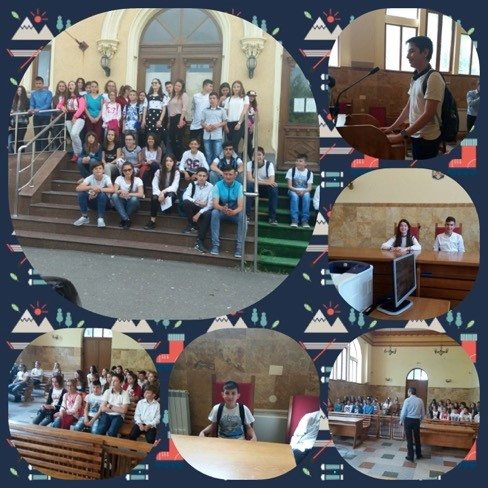Impact Grants
Return to Impact Grants
Stop the Intolerance and Indifference!
Gabriela Dobrila, Veronica Caraiani, Eugenia Ionescu and Bogdan Bolandru, Mereni, Constanta
This project was developed by Gabriela Dobrila, Veronica Caraiani, Eugenia Ionescu and Bogdan Bolandru in two schools from Mereni, Constanta. Throughout the project activities, around 100 students from 7th and 8th grades of the two schools have learned and shared with their colleagues and members of their communities information on historical themes (the Holocaust, the communist regime, slavery, international terrorism) and identified causes and solutions for social and civic themes (school violence, violence against animals, homelessness).
On the International Holocaust Remembrance Day, January 27, students organized an activity focused on the causes, consequences, and victims of the Holocaust.

The following activity, “The Process Against Intolerance and Indifference”, took place in June. The main idea was to organize a lawsuit against all types of abuse, against stereotypes, prejudices and forms of discrimination. In the preparation phase we used information from the first activity, we prepared workshops and simulation of the presentations. We organized an information trip at the Constanta County Court. The students were introduced to the civil and criminal justice world and learned about the mechanisms of justice. Then, organized in teams, the students researched events which, stemmed from stereotypes and prejudices, resulted in discrimination and genocide such as the Holocaust, the communist regime, slavery, international terrorism, etc.
They discovered that a page of the Holocaust was also written here, on the territory of our village. A labor camp was organized here for the Jewish population in the entire county of Constanta, about 2000 people. Researching historical sources has helped us to find out that the camps existed in our area between 1941 and 1942. By the end of 1941, children and the elderly had returned to their homes. The “able-bodied” people remained in the area until the spring of 1942 when they were allowed to return home. Students interviewed members of the community to learn about the events. Even if the number of direct witnesses was very small, students were able to talk with family members of direct witnesses or other indirect witnesses.
The students were very enthusiastic about the project. Some of the remarks they shared on the Facebook group of the project: “We have begun to distinguish between revenge and justice.” “Let’s have the courage to fight for our rights. Let’s have the backbone and do not bend in the face of injustice.”
